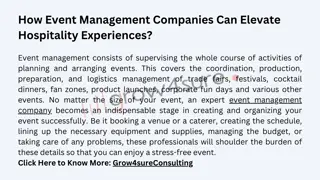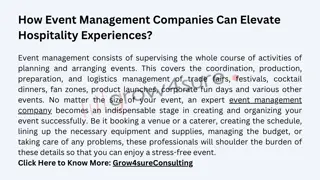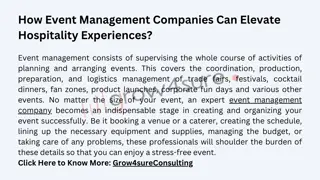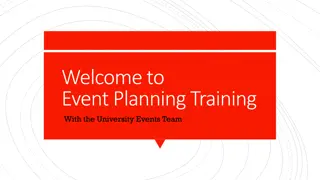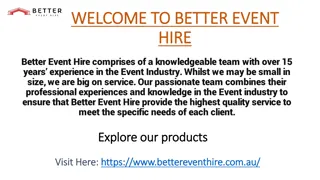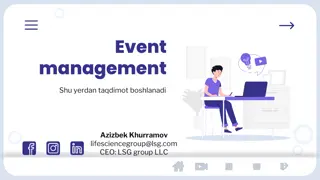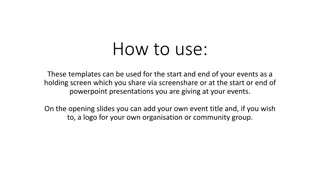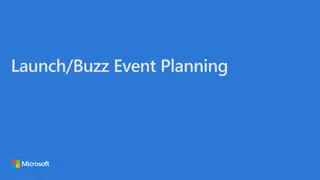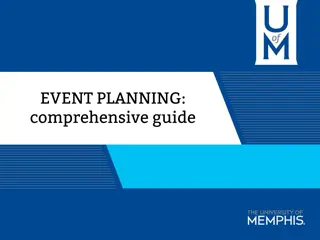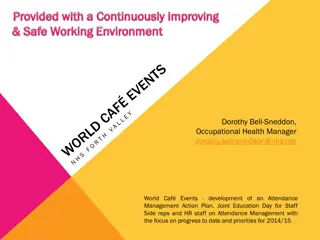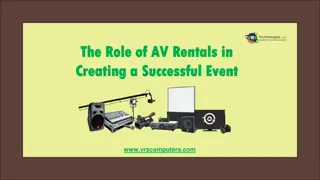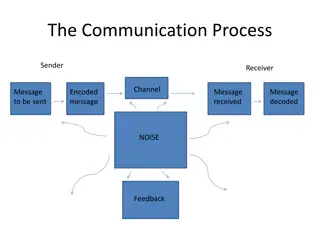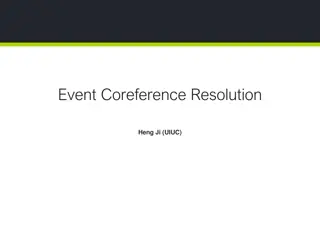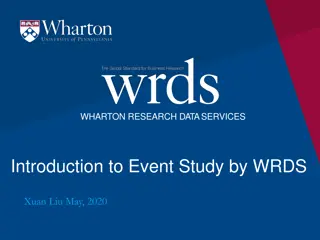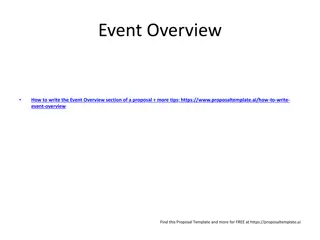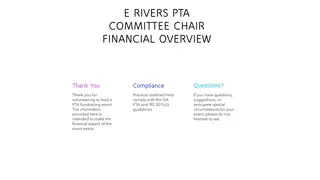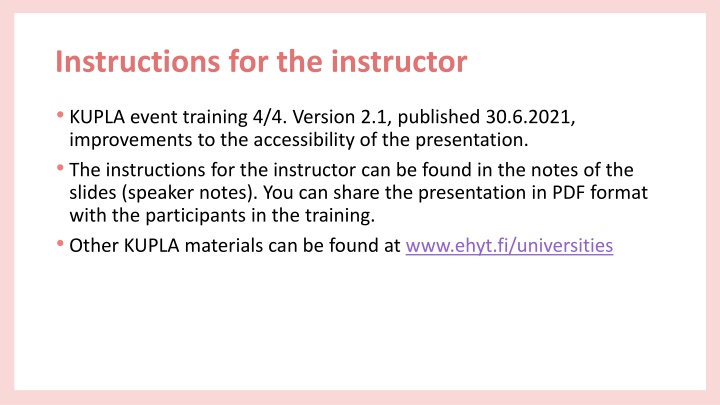
Effective Event Communication Strategies for Student Events
Learn the importance of communication in producing successful events and gain insights on event production tips, marketing strategies, and accessibility enhancements. Discover key topics like event communication, tips, and tricks to engage participants effectively and ensure event success.
Download Presentation

Please find below an Image/Link to download the presentation.
The content on the website is provided AS IS for your information and personal use only. It may not be sold, licensed, or shared on other websites without obtaining consent from the author. If you encounter any issues during the download, it is possible that the publisher has removed the file from their server.
You are allowed to download the files provided on this website for personal or commercial use, subject to the condition that they are used lawfully. All files are the property of their respective owners.
The content on the website is provided AS IS for your information and personal use only. It may not be sold, licensed, or shared on other websites without obtaining consent from the author.
E N D
Presentation Transcript
Instructions for the instructor KUPLA event training 4/4. Version 2.1, published 30.6.2021, improvements to the accessibility of the presentation. The instructions for the instructor can be found in the notes of the slides (speaker notes). You can share the presentation in PDF format with the participants in the training. Other KUPLA materials can be found at www.ehyt.fi/universities
EVENT TRAINING Event communication
Who are we? I m the event/communication coordinator. I m not the event/communication coordinator, but my duties include event communication or marketing. My organisation has some guidelines for people working with communication. I know which communication channels my organisation has.
Objectives of the workshop Event = student event Helps you understand the importance of communication in event production Gives ideas and tips for producing events of all sizes, from twenty to over one hundred people Gives ideas and tips for events that suffer from fall in attendance and sparring for events that have no problems with attendance
Topics of the workshop What is event communication? Tips and tricks for event communication Communication and accessibility
Communication + event Event communication: communication taking place around the event, e.g. Marketing and advertising the event in different channels Communication with the event participants Communication with the staff/voluntary workers/partners
Why should we talk about communication? We want people to participate in events we want people to participate in student events -> advertise and communicate well The principles of good communication are easy, but it s also easy to take missteps Event communication is a part of the organisation s communication and reputation management Insufficient communication is one reason for not attending student events (Nyyti 2015)
It gets better The workshop will cover different topics, themes and measures that may seem big, tough, troublesome or difficult to carry out. It gets better! Event communication can be improved step by step, and it s advisable to start small and build up from that. Many things are probably already in excellent order, so talk about your achievements and share best practices!
Know your target group Who do you want to attend your events? Which channels does your target group follow? Where do they visit daily, where only once a week? Which channels can you access and use for communication?
Know your target group Draw up a member survey. In a member survey, you ask the respondent s background information, their wishes concerning upcoming events, which channels they follow, in which language they want to receive communications etc. Interaction: give people the chance to ask and give feedback, answer the received messages. What is the a) easiest b) fastest way of contacting the organisation s staff? How does the organisation s staff wish to be contacted? Identify and acknowledge different groups within the membership. Freshers and international students may need different communication.
Communication plan A larger scale event should have its own communication plan. A communication plan is a guideline for communication. A communication plan includes e.g. Core message what do you want to say? Schedule for communication what; when; before, during or after the event etc. Communication channels which channels are used Target groups who are the event s audience, are there any sponsors Responsibilities who does what Style, language, tone what shape communication takes Crisis communication what to do when something goes awry
Internal and external communication Communicating with target groups: introducing the event to the target group, informing, image-building, advertising, managing expectations Communicating with sponsors and partners Internal communication means the flow of information between team members Remember to sell the event to the team: explain the image or style used to sell the event and how the organisers can help to realize the participant s expectations The best advertisement for an event is a happy participant and a proud organiser
Different channels, different styles? Until now, you have considered your target groups and the channels they follow Which communication channels are available to you? Is your event communication where your participants are? How do you communicate in these channels? Should you communicate differently in different channels?
Tips and tricks for event communication
Communication is a shared joy Communication is teamwork everyone should take part Minimum input: like a post Liking, commenting, sharing using your social media presence to benefit the event Communications team: who does what, are there shifts ? How? Instruct, inspire and share responsibility!
Schedule your communication: before the event Objective: to tell the participants when the event is, remind them of the event, encourage them to attend, build the event s image etc. Save the date, promotion, visual advertising, Facebook event, press release, pre-event hype, teaser/preview, hashtag, contest, advance marketing, sponsor introductions etc. What happens in each channel? When? What is the timeline of the advertising? Is there an event calendar for upcoming events?
Schedule your communication: during the event How can the participants share their experience? Is there a discussion taking place? Do organisers react to the discussion? Who monitors social media? Snapshots, information about the schedule, best bits etc. Selfie wall Monitor communications by following the event s hashtag
Schedule your communication: after the event Reporting, documenting, summary Feedback, praise, analysis Lost and found, post-event hype
Search your event on Google Search for images with organisation name + event What are the first hits? What is the impression the search results give about the events or organisers?
Communication and accessibility 1/2 Accessibility: accessibility of the immaterial environment Promoting inclusion and social accessibility Understanding difference: difference isn t a flaw, problem or distraction Communication can make it easier to attend an event Communication can express to the participant that they are welcome to the event
Communication and accessibility 2/2 Sufficient information about the event: does the event communication convey all the information the participant needs about the requirements, the venue, the nature of the event etc. Language and clarity: is the event communication understandable for all? What type of language is used? Is all relevant information available in text format, or is some of it in images? Imagery: what is the impression given by the visual advertising? Who are the people in the advertisements and what impression they convey about the intended audience?
What to keep, what to improve? The next slides give two examples of event advertisements. What is good about the advertisement? What needs improvement? Discuss with your group.
Example 1: Let s chill out at Nokkael in before Vappu! The event takes place at the local restaurant Nokkael in. There will be karaoke, board games, pool and beer yoga. Welcome to chill out with us before the hectic Vappu celebrations! The event takes place at a restaurant, so don t bring your own food or drinks. The bar and kitchen at the restaurant offer alcoholic and non- alcoholic drinks and sweet and savoury things at a student discount. The venue is partially accessible. What: Hanging out, gaming, karaoke, fun times Where: Restaurant Nokkael in, <address> When: Monday 29 April at 16 02 More information: Party coordinator N.N., <email>
Example 2: Singing marathon at the student house! Turn the leaves of the song book until your fingers bleed and sing until you re hoarse. Now you have the chance to sing all songs (every last one) without unnecessary toasts or food. The freshers will also prove their singing worthiness to the fresher coordinators and the song leader. People finishing the singing marathon will be awarded an overall patch. What: Singing marathon! Where: Student house, 26 April at 15.30 Why: Because singing, a MANDATORY control point for freshers
How do you communicate? Event: Baptism event for new students Fri 6 Sep 2019 at 16 21, afterparty at 20.30 03 Concept: Control points around the city + afterparty in a restaurant Free of charge Number of participants: 800 Carried out as a group, the groups are encouraged to dress according to a distinct theme Exercise: Discuss the following items from the perspective of communications.
How to communicate 1/2 What costs does attending the event cause? One of the target groups have part-time jobs and are given their work shifts two weeks in advance. The target group includes people with physical impairments. How do you register as a participant? Are there any alternatives to filling out an online form? The target group includes students who aren t familiar with the tradition of student baptism.
How to communicate 2/2 Who are in the event organisation team? How is it formed and how can you participate? A potential participant asks in the Facebook event if there is a harassment contact person present at the afterparty. How do you respond? The previous year s baptism event gained negative feedback and media attention in the local papers because one of the attending teams were dressed in a way which was offensive to minorities, e.g. novelty S mi costumes, feather headdresses, blackfaces. Now someone shares the local news story from the previous year in the Facebook event and asks whether this will happen again this year.
Advanced tips Don t just announce the event, invite the participants. Make it easier for people to attend, be approachable. Give a reminder of the event remind the registered participants. Keep the participants engaged. Is there a history to the event? Can you engage the participants of the previous event? Delegate and encourage the team to communicate. Making-of press releases or images? Make use of free image banks, invest in visuality, especially in videos. Are there resources to make a post-event video?
Crisis communication in short Responsibilities: Who will be in charge or crisis communication when something happens? The event s main organiser is responsible in student events the event team leader and the chair are involved. Who will answer external queries and give comments? Is everyone informed about what they should answer if there are questions from e.g. the media? Not communicating is never the answer. Crisis communication is communication of possibilities: media hits for the whole year in a couple of hours. When you have their attention, you should take advantage of it and present yourself in the best possible light. Crisis communication is also tough. Check the support your student union may offer.
What is crisis communication? Communication due to a crisis (e.g. accident, unexpected change in the event), the purpose of which is to: tell honestly, without speculation and with respect for privacy what has happened tell what the event organiser has done to prevent the crisis, what has been done during and after the crisis, and that the event organiser accepts responsibility for what has happened indicate who can provide more information on what has happened provide instructions, if necessary.
In the event of a crisis Find out what happened: what, where, when, what has already been done, why the crisis took place. Write a press release. Provide only the information you know to be true: do not speculate or embellish. Respect the privacy of those concerned: do not name anyone or provide personally identifiable information. Be compassionate. Avoid pretending to apologise. Ask your student union for help in crisis communication.
If you dont want to resort to crisis communication Prevent communications crises by following the event production process. Stop poor theme ideas, think about the language and imagery of event advertising in detail. Arrange communication responsibilities and policies, follow social media during the event, react to weak signals. Consider event safety and discuss with the safety coordinator. Criticism always means more visibility -> step in, utilise the visibility.
Summary Basic information about the event: what, where, when, at what time, to whom, possible cost, organisers contact information. Social media communication: considering images or visuality. Channels: consider the characteristics of each channel, such as coverage, limits and possibilities. Be accessible. Use clear language, convey information in text on time, avoid jargon and inside slang. Make an advertisement that answers any questions and makes you feel like you should go
KUPLA Students reforming substance use culture This training is produced by EHYT ry s and Nyyti ry s joint project KUPLA Students reforming substance use culture. The project ran in 2018-2020 Project s partner organisations were SYL, SAMOK, OLL and FSHS. This work is licenced with Creative Commons Attribution 4.0 International licence. To view a copy of this license, visit Creative Commons This training may be used, shared and edited freely, as long as KUPLA is mentioned as the original author. Other material by KUPLA project can be found at EHYT ry s web pages, www.ehyt.fi


